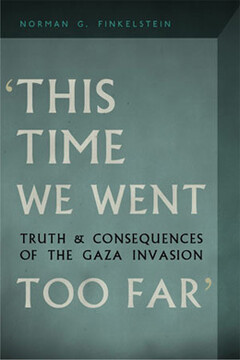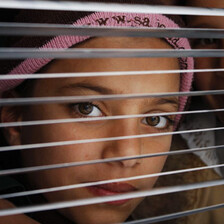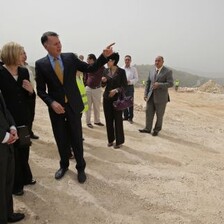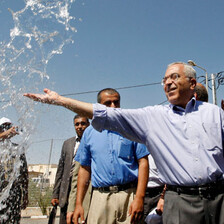The Electronic Intifada 10 February 2010
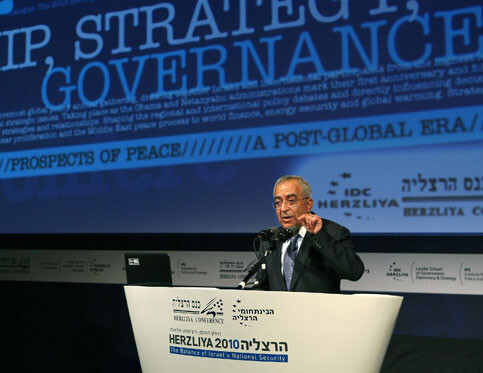
Salam Fayyad speaks at a conference on security and policy in Herzliya, north of Tel Aviv, on 2 February. Israeli Defense Minister Ehud Barak urged Israelis and Palestinians to stop “the foreplay” and engage in direct peace negotiations. (Jack Guez/AFP)
Israeli Prime Minister Benjamin Netanyahu was elected on a platform of “economic peace” with Palestinians in the West Bank. He contended that developing the Palestinian economy, by providing Palestinians with jobs and a better living stands, would render the “problems” between Israelis and Palestinians “more accessible for solutions.”
Salam Fayyad, the appointed Palestinian Authority (PA) prime minister in Ramallah and a former International Monetary Fund official, was quick to follow with his own complementary plan last August. His policies recently earned praise from Israeli President Shimon Peres who called Fayyad a Palestinian “Ben Gurionist,” in reference to Israel’s founding prime minister. Economic peace won broad backing from the UN, European leaders as well as the administration of US President Barack Obama — representatives of which form the self-appointed “Quartet” that dictates terms for the “peace process.
Tony Blair, the Quartet envoy for the Middle East peace process, characterized Fayyad as “absolutely first class — professional, courageous, intelligent.” Blair did not hold back praise for Netanyahu either, calling him a “peacemaker.”
A consensus has developed among the political elite, and even among Arab states, that improving Palestinians’ quality of life, even if under military occupation, is the long sought solution for Palestinian misfortunes. Netanyahu assigned Deputy Prime Minister Silvan Shalom to lead the economic peace task force and coordinate with both Blair and the PA.
The Netanyahu-Fayyad plan has been a magnet for foreign capital. The US Congress approved last July a deposit of $200 million into the PA treasury, under Fayyad’s direct control. In September donor countries pledged on the sidelines of the General Assembly $400 million to the PA by the end of 2009. Last month, the European Union transferred 21 million Euros to “help the Palestinian Authority pay the January salaries and pensions of 80,551 Palestinian public service providers and pensioners.”
This “West Bank First” policy of economic development replaced Bush’s failed policy of democracy promotion. In 2006, Palestinians in the West Bank and Gaza Strip elected Hamas but Israel and its western allies boycotted the movement because it did not conform to the demands of the Quartet, much of them at odds with international law.
The Quartet switched strategies towards finding “moderate” partners that can implement their vision of “peace.” One such person is PA President Mahmoud Abbas, whose term in office expired for the second time last month (after being questionably extended for an additional year in early 2009).
Western donors also hand-picked Salam Fayyad for the post of prime minister despite his Third Way party obtaining less than three percent of the popular vote in the 2006 legislative elections. His exclusive control of the Palestinian coffers give him immense power to implement policies to his own credit as speculation — and in some PA circles fear — grows that he is being groomed by the West to replace Abbas.
“Economic peace,” coupled with the “West Bank First” policy of economic development serves too as warning to Palestinians. They either conform to a political program approved by Israel and Western donors or risk sharing the dire fate of Gaza, under a crippling siege since June 2007. Hamas, under intense pressure, is gradually softening its positions, with cautious overtures to Israel and the West with the hope of inclusion in the process and perhaps a slice of the monetary rewards.
The results of the first year of Netanyahu’s economic peace are visible. While there has been no progress on the political front, security and economic cooperation with the PA has never been better. The American-trained security forces have kept a tight grip over West Bank towns squashing dissent and keeping “order.” When the Israeli army invades during the night, Palestinian security forces swiftly retreat. Intelligence sharing has enabled joint campaigns of arrest against members of the resistance.
The Guardian newspaper reported that Palestinians security forces have been working closely with the CIA to torture Palestinian dissenters. When Palestinians killed a settler last December, Abbas’ forces worked “overtime” to find the culprits arresting hundreds in the process. A PA spokesperson described the security situation up to the attack as “nearly perfect,” in reference to the diligent job of Palestinian security forces in preventing attacks against Israelis but ignoring the daily attacks Palestinians are subjected to at the hands of the Israeli military and settlers. Abbas’ clampdown didn’t prevent an Israeli death-squad from invading Nablus and killing in cold blood three Palestinians as an act of revenge.
Israel deems the PA a trusted partner for its diligent efforts to provide security for Israelis including settlers actively engaged in colonizing the West Bank. This perception motivated Netanyahu to order the dismantlement of a few dozen roadblocks and the lifting of strategic checkpoints to ease movement between Palestinian cities. Over 578 “closure obstacles” remain in place inside the West Bank. According to the UN, “while some of these measures have contributed to the easing of movement, they exact a price from Palestinians in terms of land loss, disruption of traditional routes, and deepening fragmentation of West Bank territory.” These “goodwill gestures” help give the impression of improvements nonetheless.
Other policies targeting the 17 percent of the West Bank controlled by the PA, otherwise designated as Area A under the 1993 Oslo accords, include the opening of a shopping center in Jenin and a cinema in Nablus. Netanyahu plans 25 other economic initiatives in the West Bank including more shopping centers, a light industrial zone in the Bethlehem area, a major industrial zone in the Jenin area and an agricultural processing and export zone in Jericho. Each ribbon cutting ceremony Fayyad attends reinforces the normalcy discourse propagated by the PA and Fatah-affiliated media that contrast it to the destruction and despair of Israeli-blockaded, Hamas-controlled Gaza.
There are fears these projects are attracting foreign speculators. “My message is very clear: there is an economic prize before us, there is a double dividend for you as companies” said British Prime Minister Gordon Brown to a conference of investors in Bethlehem. One such “prize” is the creation of a Palestinian equity market. The Palestine Investment Fund (PIF), the body leading such effort, expects to deliver an annual return of 15 percent. PIF plans to use cash deposits in local banks as well as money from investors to encourage growth in consumer spending. “Our banks have cash deposits of $7 billion, and they are saying there are not enough opportunities to invest,” said Mohammad Mustafa, the Fund’s chief executive and a former World Bank official.
Real Estate is the main target for foreign corporate investment. Rawabi, the first Palestinian planned city, is Fayyad’s flagship project. The Washington Post reported that Rawabi “is specifically designed for upwardly mobile families of a sort that in the United States might gravitate to places such as Reston, VA. The developments are also relying on another American import, the home mortgage, including creation of a Fannie Mae-style institution for the West Bank.” USAID, a branch of the American government, is funneling funds through nongovernmental organizations (NGOs) for the promotion of a mortgage culture in Palestine to support these initiatives from bottom-up. One such example is CHF International, a corporate-led development NGO, which is organizing community level focus groups and technical training as part of their “homebuyer education” program.
A year on, the cost of the Netanyahu-Fayyad plan is becoming clear. Low-income Palestinian families and small business are being encouraged to borrow to fuel a high-risk economy. Israel has proven time again that it won’t hesitate to strike a blow against Palestinian infrastructure should they dissent from the current consensus in its favor. Families are risking their possessions as collateral for their debts. Corporations responsible for the global financial collapse are applying their failed models in Palestine. Abraaj Capital, a Dubai-based investment fund that recently sparked fears for debt default, announced a $50 million private equity fund dedicated to “raising standards of living,” mirroring the predatory behavior that led to the collapse of the sub-prime mortgage system in the US.
Investors, Palestinian and internationals, are leading in the efforts for normalization of economic relations with Israel in violation of the boycott, divestment and sanctions (BDS) call of Palestinian civil society. There is concern about the growing power that the emerging Palestinian capitalist class can yield over the political process as the personal stakes rise as their economic relationships with Israel intensify. Abbas is said to have yielded to pressure from economic interests when he forfeited UN discussion of the Goldstone report last October causing popular outrage.
The economic peace model comes with a dose of cultural imperialism. Palestinians do not have basic freedoms but they are being told that they can enjoy the mundane and superfluous in cinemas and shopping centers. This is more vividly seen in wall-encircled Ramallah, the seat of the PA government. High-end clubs are appearing to cater for the western-oriented elite. These spaces draw invisible barriers of class and social status that the majority of people cannot relate to or simply cannot afford. This sort of social stratification inevitably leads to the creation of an individualist and self-interested culture and to contentment for the status quo. The availability of disposable income has even encouraged the presence of Russian chains of prostitution in the city. Fahmi Shabaneh, former head of the PA’s Anti-Corruption Department, was forced to quit from his position last year after uncovering a sex scandal involving one of Abbas’ top aides in Ramallah. As expected, the PA denies the accusations. Shabaneh said that “Abbas has surrounded himself with many of the thieves and officials who were involved in theft of public funds and who became icons of financial corruption.”
There is also a division being fostered between the urban and the rural populations. The Palestinians living in the 60 percent of the West Bank officially controlled by Israel, also known as Area C, are continuously dispossessed of their land and gradually being pushed to PA-controlled enclaves. The almost exclusive focus of Fayyad’s plan on the service sector, while ignoring the farming community, will inadvertently lead to acceleration of desertification of the rural areas as the young are pulled to new jobs in the city. The Bantustanization process is accelerating with the construction of Israel’s apartheid wall. The rural population, represented by the popular committees, is now leading resistance against Israel’s encroachment. They have been left without effective political representation, finding themselves in the front line of Israel’s annexationist policies. These two dichotomous realities, the urban and the rural, have left certain sectors of the population in urban centers like Ramallah to be completely oblivious to these struggles only a few miles away.
Hamas’ election in 2006 showed how vital is the Palestinian Authority’s dependence on foreign donors. It also showed how easily donors can turn off the money tap and cause the near destruction of the Palestinian social fabric as in Gaza. The plan that is being forged in the West Bank is fostering such dependence even more, raising the costs for sustaining the Palestinian struggle for liberation. Should the masses awaken from the current delusion, many of the rich elites would not hesitate to turn against their brethren to protect their status and power. Adding to the current political and territorial separation affecting Palestinians, the emerging economic stratification is yet another challenge in the way of Palestinian unity and liberation.
Ziyaad Lunat is an activist for Palestine. He can be reached at z.lunat A T gmail D O T com.
